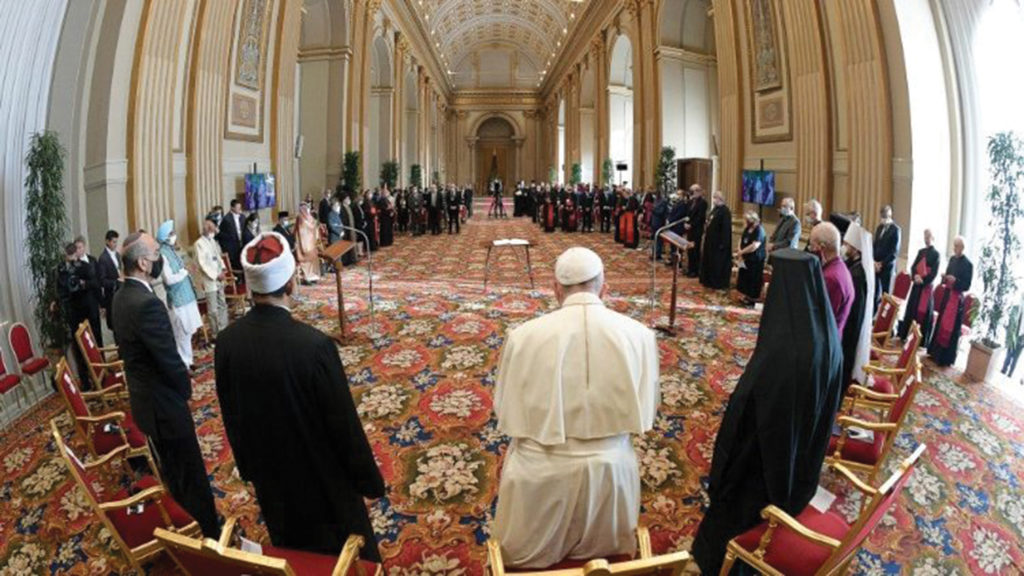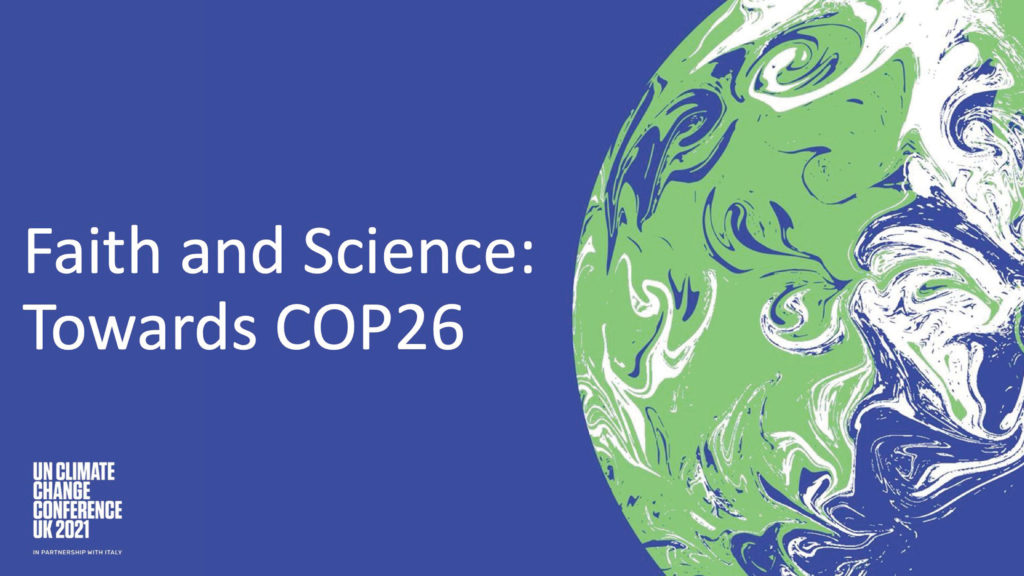RADAR

FAITH AND SCIENCE: COP26 AND BEYOND
An historical milestone on the care for the Earth took place in the Vatican, prior to the celebration of the Conference of Parties (COP26). In a fraternal spirit of dialogue and solidarity more than 40 faith leaders of world religions and several scientists from 20 countries, united their voices to plea for action against the disastrous effects of climate change that are destroying our common home and inflicting devastation upon humanity
BY FR RAFAEL ARMADA MCCJ | PRETORIA
As Benedict Mayaki SJ reported for Vatican news, Pope Francis, in his opening address spoke of interconnectedness. “Science, as well as our religious beliefs and spiritual traditions, highlight the connectedness between humanity and the rest of creation; no creatures are self-sufficient; they exist only in dependence on each other, complementing one another and in the service of one another,” the Pope said. Recognizing this interconnectedness, therefore, means not only realising the harmful effects of our actions, “but also identifying behaviours and solutions to be adopted, in an attitude of openness to sharing, that for Christians, springs from the very mystery of the Triune God.”
Pope Francis emphasized that the common commitment must be driven by the dynamism of love, for “in the depths of every heart, love creates bonds and expands existence, it draws people out of themselves and towards others. Love is the mirror of an intense spiritual life: a love that extends to all, transcending cultural, political and social boundaries; a love that is inclusive, concerned especially for the poor, who so often teach us how to overcome the barriers of selfishness and to break down the walls of our ego.”
The Pope reiterated the need to counter the ‘throwaway culture’, and the ‘seeds of conflict’ which cause serious wounds to the environment and lead to the breaking of “that covenant between human beings and the environment, which should mirror the creative love of God, from whom we come and towards whom we are journeying.”
Joint Appeal
At the end of the encounter, a document was signed by the participants and presented to Alok Sharma, the president-designate of the COP26 climate summit, and to Luigi di Maio, Italian minister for foreign affairs. In their joint appeal, the participants agreed on the urgency for preventing the average global temperature from rising beyond 1.5ºC, compared to preindustrial levels. They reiterated their plea to world governments and parties participating in COP26, to take the necessary measures to achieve global zero net carbon emission “as soon as possible, with wealthier countries taking the lead in reducing their own emissions and in financing emission reduction for poorer nations”.
In their document, they expressed their awareness that nature is not only a gift but “a life-giving force without which we cannot exist”. World religious traditions share, as integral part of their beliefs, the need to protect the human family and the environment, behaving as caretakers, and not as masters, of a beautiful garden that must not be handed over as a desert to future generations. They acknowledged that the damage inflicted on the environment comes as a result of predatory exploitative tendencies by human beings that, with greedy eyes, see nature as a means to satisfy their selfish ambitions. This attitude manifests a wider “crisis of values, ethical and spiritual”.
Faith and science, “as pillars of human civilization” complement each other, and their leaders now have joined hands to raise awareness and demand action from world political leaders. The planet is “warmer than any time in the last 200 000 years” they say, and if radical measures are not taken immediately, we are heading for catastrophic consequences that will affect all humanity, but particularly the poor and most vulnerable communities, the least responsible for the current environmental degradation.

Source: www.gov.uk/ Flickr
A New Economic Narrative
Faiths leaders and scientists advocate for a “new narrative of development that places the human dignity at its centre, inclusive and caring for the environment”; a new culture of being in the world, in a sustainable way, not exploitative, but supporting life. Action is urgent at all levels, individually with behavioural changes in consumption and lifestyles and more eco-friendly attitudes—and on the level of government policies and world decision-making processes stopping the spiral of climate change deterioration.
According to the joint appeal, richer countries should fulfil their commitments expressed in the Paris Agreement and honour their promises to support developing countries towards adaptation to greening; helping them to combat the effects of climate change already felt in their own lands. The rights of indigenous peoples, caretakers of the Earth for millennia, and local communities, need also to be respected. A just transition to clean energy, to a sustainable use of the land—including preventing deforestation, restoration of forests and conserving biodiversity—conservation of water, ending of hunger and promoting sustainable lifestyles are all urgent and unavoidable commitments required from world leaders.
Educational challenge
In order to achieve these goals, all bodies of society—family, religious institutions, schools and universities, business and financial systems—need to get involved; ensuring that all voices, particularly their most vulnerable members, are valued and heard. An educational process is needed to abandon the consumeristic culture and “embrace a culture of care and co-operation.” Faiths leaders committed themselves to advancing transformation, promoting a change of heart among their congregants, in their way of treating the Earth and other people (ecological conversion). They recognised the signs of divine harmony present in the natural world. They encouraged educational and cultural institutions to pay attention to relevant scientific insights and to strengthen ecological education instilling moral values and virtues in students. They also pledged to participate in public discourse on environmental issues, sharing their spiritual, moral and religious perspectives and uplifting the voices of the weakest and most vulnerable.
Example from home
They committed to engaging their congregations in building sustainable, resilient and just communities, promoting small-scale agriculture and renewable energy initiatives.
Faiths, leaders, and scientists pledged for environmental initiatives within their institutions, reducing carbon emissions, preserving water, improving waste management, developing renewable energy and in general protecting the environment. They will also pursue full sustainability in their buildings, land, vehicles and other properties; embrace simple and sustainable lifestyles, align their financial investments with environmental standards—moving away from investments in fossil fuels—and purchase goods and services in line with the same ethical principles. They appealed to everyone to join in this journey with hope, courage, solidarity and good will “encouraging a prophetic vision, a creative, respectful and courageous action for the sake of the Earth.”
